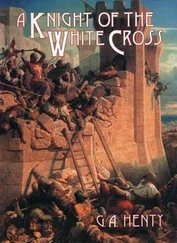There can, however, be little doubt that the misfortune which appeared so terrible to the citizens was regarded by Nero in a different light. Nero was prouder of being an artist than of being an emperor. Up to this time Rome, although embellished with innumerable temples and palaces, was yet the Rome of the Tarquins. The streets were narrow, and the houses huddled together. Mean cottages stood next to palaces. There was an absence of anything like a general plan. Rome had spread as its population had increased, but it was a collection of houses rather than a capital city.
Nero saw at once how vast was the opportunity. In place of the rambling tortuous streets and crowded rookeries, a city should rise stately, regular, and well ordered, with broad streets and noble thoroughfares, while in its midst should be a palace unequalled in the world, surrounded by gardens, lakes, and parks. There was ample room on the seven hills, and across the Tiber, for all the population, with breathing space for everyone. What glory would there not be to him who thus transformed Rome, and made it a worthy capital of the world! First, however, the people must be attended to and kept in good humour, and accordingly orders were at once issued that the gardens of the emperor's palaces should be thrown open, and the fugitives allowed to encamp there. Such magazines as had escaped the fire were thrown open, and food distributed to all, while ships were sent at once to Sicily and Sardinia for large supplies of grain for the multitude.
While the ruins were still smoking the emperor was engaged with the best architects in Rome in drawing out plans for laying out the new city on a superb scale, and in making preparations for the commencement of work. The claims of owners of ground were at once wiped out by an edict saying, that for the public advantage it was necessary that the whole of the ground should be treated as public property, but that on claims being sent in other sites would be given elsewhere. Summonses were sent to every town and district of the countries under the Roman sway calling for contributions towards the rebuilding of the capital. So heavy was the drain, and so continuous the exactions to raise the enormous sums required to pay for the rebuilding of the city and the superb palaces for the emperor, that the wealth of the known world scarce sufficed for it, and the Roman Empire was for many years impoverished by the tremendous drain upon its resources.
The great mass of the Roman population benefited by the fire. There was work for everyone, from the roughest labourer to the most skilled artisan and artist. Crowds of workmen were brought from all parts. Greece sent her most skilful architects and decorators, her sculptors and painters. Money was abundant, and Rome rose again from her ruins with a rapidity which was astonishing.
The people were housed far better than they had ever been before; the rich had now space and convenience for the construction of their houses, and although most of them had lost the greater portion of their valuables in the fire, they were yet gainers by it. All shared in the pride excited by the new city, with its broad streets and magnificent buildings, and the groans of the provincials, at whose cost it was raised, troubled them not at all. It was true that Nero, in his need for money, seized many of the wealthier citizens, and, upon one pretext or other, put them to death and confiscated their property; but this mattered little to the crowd, and disturbed none save those whose wealth exposed them to the risk of the same fate.
Beric saw nothing of these things, for upon the very day after the fire died out Scopus started with his scholars to a villa on the Alban Hills that had been placed at his disposal by one of his patrons. There were several other schools in the neighbourhood, as the air of the hills was considered to be far healthier and more strengthening than that of Rome. In spite of the public calamity Nero continued to give games for the amusement of the populace, other rich men followed his example, and the sports of the amphitheatre were carried on on an even more extensive scale than before.
Scopus took six of his best pupils to the first games that were given after the fire. Four of them returned victorious, two were sorely wounded and defeated. Their lives had, however, been spared, partly on account of their skill and bravery, partly because the emperor was in an excellent humour, and the mass of the spectators, on whom the decision of life or death rested, saw that the signal for mercy would be acceptable to him.
The Britons greatly preferred their life on the Alban Hills to that in Rome; for, their exercises done, they could wander about without being stared at and commented upon.
The pure air of the hills was invigorating after that of the great city; and here, too, they met ten of their comrades whose ludi had been all along established on the hills. Plans of escape were sometimes talked over, but though they could not resist the pleasure of discussing them, they all knew that it was hopeless. Though altogether unwatched and free to do as they liked after the work of the day was over, they were as much prisoners as if immured in the strongest dungeons. The arm of Rome stretched everywhere; they would be at once followed and hunted down wherever they went. Their height and complexion rendered disguise impossible, and even if they reached the mountains of Calabria, or traversed the length of Italy successfully and reached the Alps—an almost hopeless prospect—they would find none to give them shelter, and would ere long be hunted down. At times they talked of making their way to a seaport, seizing a small craft, and setting sail in her; but none of them knew aught of navigation, and the task of traversing the Mediterranean, passing through the Pillars of Hercules, and navigating the stormy seas beyond until they reached Britain, would have been impossible for them.
News came daily from the city, and they heard that Nero had accused the new sect of being the authors of the conflagration, that the most rigid edicts had been issued against them, and that all who refused to abjure their religion were to be sent to the wild beasts in the arena.
Beric had not seen Norbanus since the day when he had saved his library from the fire; but a few days after they had established themselves in the hills he received a letter from him saying that he had, after much inquiry, learned where Scopus had established his ludus; he greatly regretted Beric had left Rome without his seeing him, and hoped he would call as soon as he returned. His family was already established in a house near that of Lucius. After that Beric occasionally received letters from Aemilia, who wrote sometimes in her father's name and sometimes in her own. She gave him the gossip of Rome, described the wonderful work that was being done, and sent him letters from Pollio to read.
One day a letter, instead of coming by the ordinary post, was brought by one of the household slaves.
“We are all in terrible distress, Beric,” she said. “I have told you about the severe persecution that has set in of the Christians. A terrible thing has happened. You know that our old nurse belonged to that sect. She often talked to me about it, but it did not seem to me that what she said could be true; I knew that Ennia, who is graver in her disposition than I am, thought much of it, but I did not think for a moment that she had joined the sect. Two nights ago some spies reported to one of the praetors that some persons, believed to be Christians, were in the habit of assembling one or two nights a week at a lonely house belonging to a freedman. A guard was set and the house surrounded, and fifty people were found there. Some of them were slaves, some freedmen, some of them belonged to noble families, and among them was Ennia.
Читать дальше












